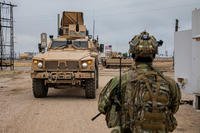Chiefs Detail Readiness Crisis; Hill Offers No Relief
Defense Department civilian and military leaders gave full details this week of the readiness crisis unfolding across America’s armed forces, and got back not a whit of reassurance from Congress that relief is on the way.
Members of the once-powerful House and Senate armed services committees spoke as though resigned to the notion that U.S. forces could be hollowed out over the next several years due to political gridlock and a now infamous “sequestration” gimmick that made a hostage of the defense budget, then wounded it, during failed debt reduction negotiations.
Despite hours of dark testimony by defense leaders and the Joint Chiefs that force readiness, including individual and unit training, depot maintenance, flying hours and ship steaming days, are about to take the deepest budget hit since the end of World War II, lawmakers offered no solutions. Many committee members merely continued to carp at one another, and at President Obama, over who should bear the most blame.
“I used to say I was hopeful and optimistic,” said Deputy Defense Secretary Ashton Carter. “Then I said I was just hopeful. Now I’m not even hopeful because we are only two weeks away from” sequestration March 1, when the department will have to absorb another $46 billion in spending cuts through the final seven months of fiscal 2013, which ends Sept. 30.
Rather than propose a relief plan, Rep. Howard P. “Buck” McKeon (R-Calif.), chairman of the House Armed Services Committee, announced that “now it appears that this self-inflicted wound [of sequestration] is poised to cripple our military forces in just a few days.”
“The President is not blameless,” McKeon said. “His negotiators put sequestration on the table during the long fight over the debt ceiling. We are not blameless either. Many of us voted for this terrible mechanism in the naive hope the President and Congress could put our politics aside and fix our debt crisis. That was a bad bet.”
McKeon asked Army Gen. Martin E. Dempsey, chairman of the Joint Chiefs, if he stood by his statement of last April that the services cannot accept deeper defense cuts than $487 billion over 10 years agreed to in 2011 and still carry out the current Asia-Pacific defense strategy.
“Do I stand by my statement of last year? No,” said Dempsey. “I am now jumping up and down. This is not about standing next to anything. We are on the verge of a readiness crisis due to an unprecedented convergence of factors…[T]he prolonged specter of sequestration while under a continuing resolution while we are just beginning to absorb $487 billion worth of cuts from 2011, and while we’re still fighting and resourcing a war.”
Dempsey said other factors also make this drawdown period for defense spending and force strength “more difficult and decidedly different than at any other point in our history. There is no peace dividend. The security environment is more dangerous and more uncertain. Most of our equipment is older and aging fast. End strength caps [imposed by Congress] limit our ability to shape the force. And health care costs are reaching unsustainable levels,” Dempsey said.
So sequestration, which will cut defense by another $500 billion over the decade, “will upend our defense strategy,” Dempsey warned. “It will put the nation at greater risk of coercion and it will require us to break commitments to the men and women in uniform and their families, to our defense industrial base and to our partners and allies.”
Gen. Raymond T. Odierno, Army chief of staff, called the fiscal outlook for his service “dire and…unprecedented.”
Because of budget gridlock, the services already are operating under a “continuing resolution” rather than a new appropriations bill, which freezes spending below fiscal 2012 levels. This on top of sequestration, and having to make up a shortfall in operating dollars for Afghanistan, is forcing the Army to spend $18 billion less than planned on operations and maintenance from March through September and to cut other programs by $6 billion.
Unless Congress acts, Odierno warned, training will be curtailed for 80 percent of Army ground forces. About 251,000 Army civilians will be furloughed for up to 22 days through September. Depot maintenance will be canceled causing 5000 skilled employees, including welders and mechanics, to lose their jobs, and impacting equipment readiness for six Army divisions.
The Army already plans to cut its active force by 60,000 through fiscal 2017. With sequestration, it must shed at least another 100,000 soldiers across active, Guard and Reserve unit. Sequestration will be felt across every base and installation and will force delays to every one of 10 of major Army modernization programs, harming the service’s ability to “reset our equipment after 12 years of war” and causing “unacceptable reductions in unit and individual training,” Odierno said.
“I began my career in a hollow Army. I do not want to end my career in a hollow Army,” he said, noting that today’s volunteers deserve better.
“We simply cannot take the readiness of our force for granted. If we do not have the resources to train and equip the force, our soldiers…are the ones who will pay the price, potentially with their lives.”
The other service chiefs made similar dire warnings of swift and devastating declines in readiness from waves of budget cuts they are powerless to stop or even ease. Though pay, benefits and manpower accounts are exempt from sequestration this year, the service chiefs said military families still would feel the impact as base support services and facility maintenance dollars are rolled back.
Deputy Secretary Carter said the TRICARE program could find itself short as much as $2 billion this fiscal year, forcing delays in payments to health care providers until the next budget year Oct. 1.
Rep. Jim Cooper (D-Tenn.) said it was “a sad day for this committee” to hear military leaders detail their budget emergency and to realize the committee plans to do no more than talk about it. The House this week focused on “trivial legislation,” he said, and next week plans to be in recess.
Rep. Mike Rogers (R-Ala.) asked General Dempsey if he had told the president of the dire consequences to readiness from sequestration March 1.
“We have had that conversation,” Dempsey said.
How did the president’s respond? Rogers asked
“He assured me he’s working on it,” said Dempsey.
To comment write Military Update, P.O. Box 231111, Centreville, VA, or email milupdate@aol.com or twitter: Tom Philpott @Military_Update.









